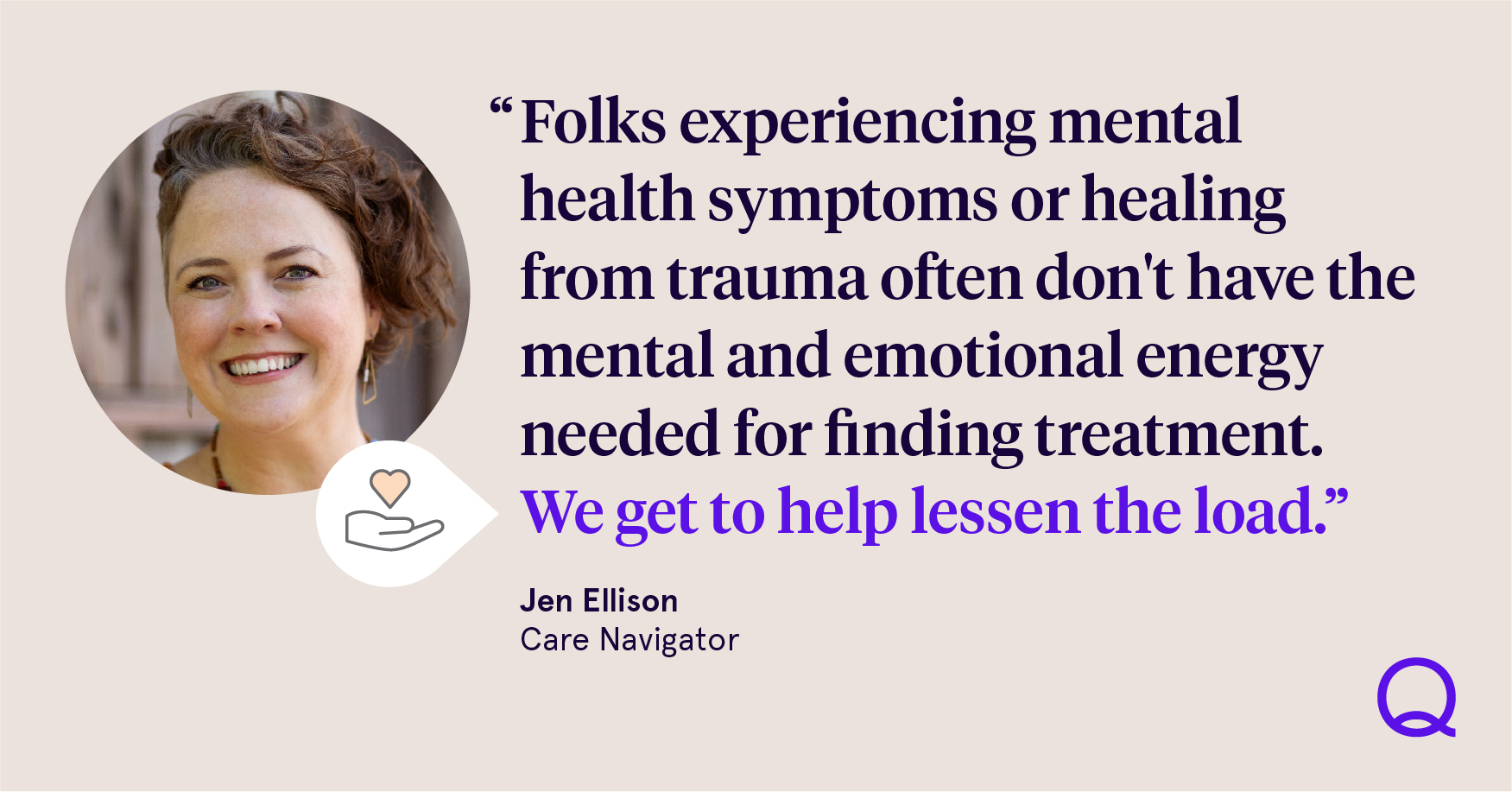A Day in the Life of a Quartet Care Navigator

May 18, 2022
Quartet’s Care Navigators play an important role in making sure patients are connected to the right care for their clinical needs. Here’s a snapshot into a typical day of one of our Care Navigators, Jen Ellison, and her role in patients’ care journeys.
What is your background? How long have you been with Quartet, and how did you get here?
I joined Quartet almost exactly a year ago! I transitioned here from Duke, where I worked with newly postpartum parents and as a care manager for Population Health. Prior to Duke, I spent more than a decade as a therapist in community mental health.
Describe your role at Quartet.
I’m the Clinical Care Navigator for Quartet’s New Jersey and Pennsylvania markets. I work on connecting clinically complex patients to providers, support patients with acute needs who require triage, consult on clinical issues with other Care Navigators, and evaluate high acuity new referrals to ensure these patients are safe to wait for connection to care.
What does a typical day look like for you?
It varies a good bit! I usually jump in to help my market team with any backlog needs and make some calls to our East Coast patients first, then transition to reviewing clinically acute new referrals and expediting those patients as appropriate. I often field a Slack or two to review complex cases and next steps for other CNs. At any point, I may need to stop what I’m doing to take an incoming call from a distressed patient, one experiencing a medication shortage or mental health crisis, or a patient who needs expedited connection to a provider.
What kinds of patients do you most commonly support? What kinds of needs or problems are they facing with regards to care?
As a Clinical Care Navigator, the patients I work with usually have significant mental health concerns (Bipolar Disorder, schizophrenia) or are using substances. These patients may face obstacles related to how their mental symptoms impact their functioning (lack of energy/motivation, anxiety, cognitive distortions, SI, hallucinations or delusions), so being able to streamline the process of getting them connected to a provider is really invaluable.
Can you share some memorable or particularly rewarding patient cases that have stood out to you?
Most recently, there was an older woman who was homebound and had chronic pain, and she had never tried therapy before. I caught her on a difficult day and she expressed that while she wouldn’t harm herself, she didn’t want to be here anymore. She really wasn’t enjoying anything about her life and wasn’t sure therapy could be helpful. I validated her experience, tried to build rapport with her, and offered hope that if nothing else, therapy could at least decrease her isolation. It was enough to open her to giving it a try (or as she said: “why the heck not?”).
There was also a patient we’d connected to care who became tearful when I called her to follow up on a recent appointment with her matched provider. She shared that she felt heard and seen by her provider, that he didn’t judge her or her situation, and that Quartet had been incredibly helpful in connecting her to him “at a time when I could barely function”. It was a reminder of why we do what we do. Folks experiencing mental health symptoms or healing from trauma often don’t have the mental and emotional energy needed for finding treatment. We get to help lessen the load.
How have patients responded to the part you’ve played in their care journey?
I’m from the South. When I started at Quartet, a lot of folks warned me that “people from New Jersey aren’t like people from North Carolina”. I envisioned a stereotype: blunt, abrasive, too busy to talk to me – which is actually the opposite of the people I’ve encountered in my market. I’m always taken aback by the kindness and gratitude I so often hear expressed by our patients, even in the midst of whatever difficulty is leading them to mental health treatment.
What do you love about your job?
I came to Quartet because improving access to care is something I’ve wanted to work on for years, ever since I was in community mental health and saw the barriers folks encountered trying to get to care. I love getting to do the work of connecting our patients to mental health treatment. I love partnering with them to navigate barriers, and breaking down stigma by talking candidly with them about their mental health. And I love working with a team of smart, dedicated people who share that same passion for improving access.
Explore more

7 Things I Wished I’d Known Before Starting Therapy
Going to therapy is like opening up a history book about yourself, written by you, and sharing it with a stranger.

What Microaggressions Are Really Doing to Your Health
They may have the word “micro” in them, but microaggressions are often likened to “death by a thousand cuts.”

COVID Has Changed The World as We Know It — It’s Okay to Grieve
Grief is a normal part of the human experience, but we live in a society that has little room for it.



